Key takeaways:
- Understanding tax implications and proactive tax planning empower individuals to make informed financial decisions and avoid unexpected liabilities.
- Common tax myths, such as misconceptions about deductions and refunds, can lead to disappointment and underscore the importance of accurate knowledge.
- Long-term tax considerations, like the impact of tax brackets and investment choices, are crucial for effective financial strategy and future planning.
- Maximizing contributions to tax-advantaged accounts and keeping detailed records can significantly minimize tax burdens and facilitate easier tax preparation.
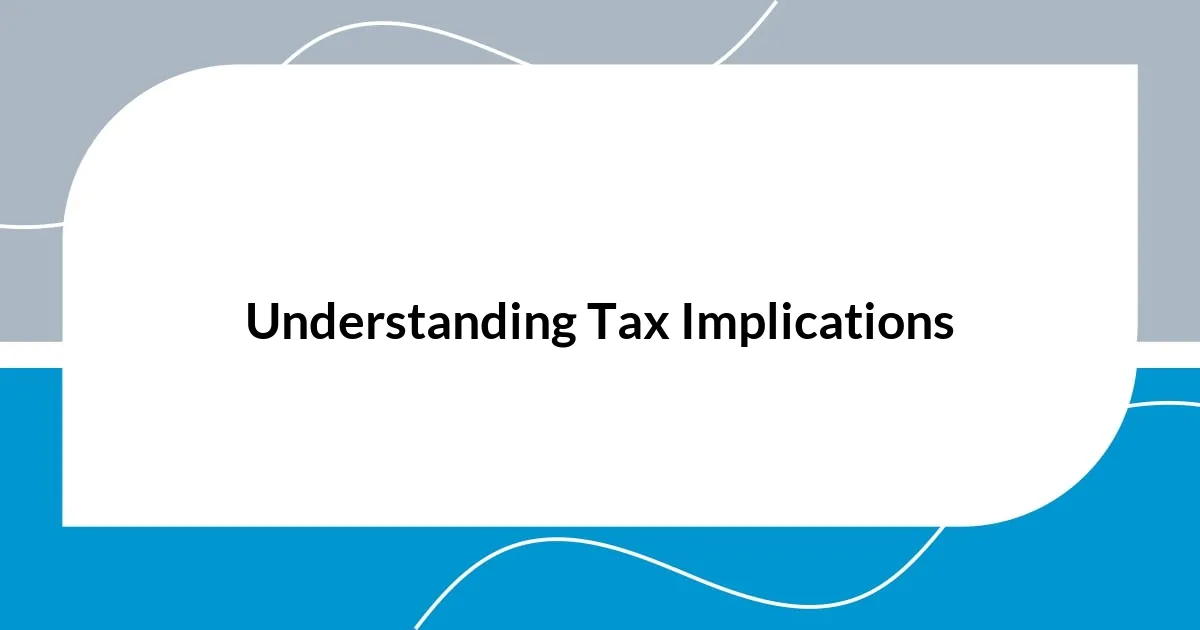
Understanding Tax Implications
Understanding tax implications can feel overwhelming, yet it’s crucial for anyone wanting to manage their financial well-being effectively. I remember the first time I received a tax bill; the sheer panic set in as I puzzled over what I had done wrong. Did I claim too much? Did I miss a deduction? This experience taught me that grasping how taxes work isn’t just prudent; it’s empowering.
When considering tax implications, think about the long-term effects on your investments and income. For example, if you sell an asset, like a property, the capital gains tax can significantly affect how much profit you actually keep. I’ve had encounters where friends were so excited about selling their homes, only to be caught off guard by the tax bill afterward. Wouldn’t it be helpful to know these costs upfront to make better decisions?
Moreover, understanding tax brackets and deductions is essential. It can influence not only how much you owe but also how much you can save. I often find myself asking, “Am I utilizing all available deductions?” It’s a reflection of how proactive I need to be with my finances. This constant learning process keeps me engaged and helps me make better-informed financial choices.
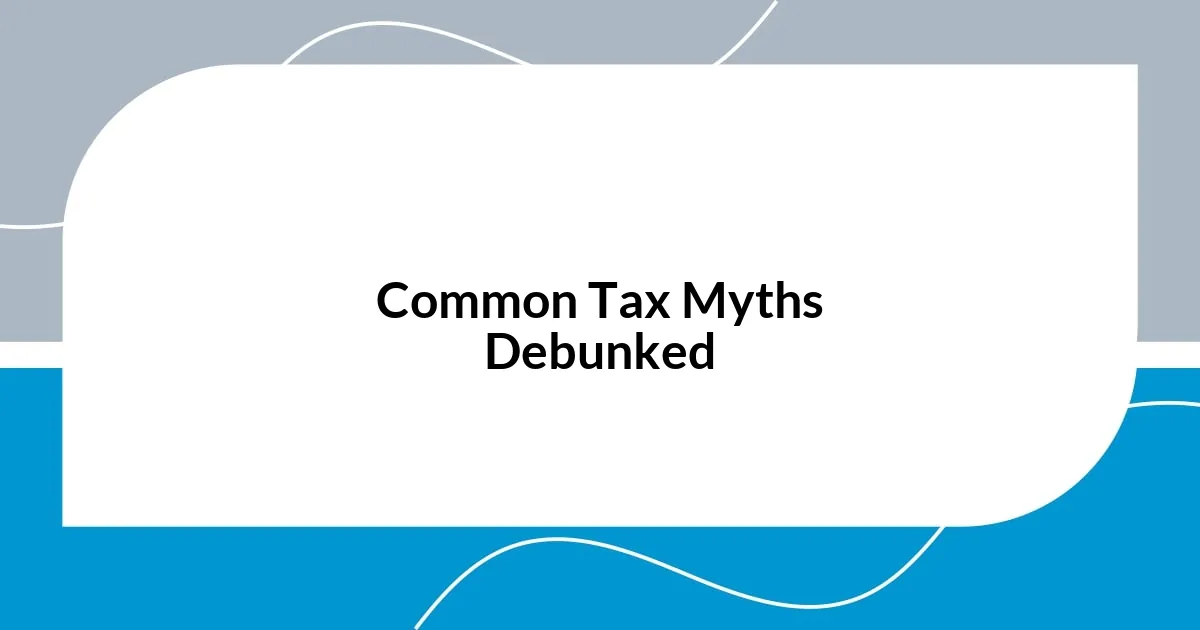
Common Tax Myths Debunked
Many people believe that tax deductions are available for everything they spend money on, but that’s not accurate. I recall a time when a friend thought he could deduct his entire vacation because he conducted a business meeting during the trip. While it’s amusing to think about, the reality is that only the expenses directly related to business activities qualify for deductions. This misconception can lead to disappointment come tax season, trust me.
Another prevalent myth is that if you receive a tax refund, you are getting free money. I used to think this way too, until I learned that a refund essentially means you’ve overpaid your taxes throughout the year. It’s a bit like lending the government your hard-earned cash without interest. Rather than viewing a refund as a windfall, I now see it as an opportunity to adjust my withholding and keep more of my money throughout the year.
Many believe that holding onto their tax documents is unnecessary after a few years, assuming they’ll never need them. I once encountered a colleague who discarded her tax returns after three years, only to receive an audit notice four years later. This experience taught me the importance of being diligent with record-keeping. You never know when those documents will come in handy, especially if there are discrepancies with the IRS.
| Tax Myth | Reality |
|---|---|
| All expenses are deductible. | Only business-related expenses qualify. |
| A tax refund is extra income. | A refund indicates overpayment of taxes. |
| Tax documents can be discarded after a few years. | It’s wise to keep them for at least seven years. |
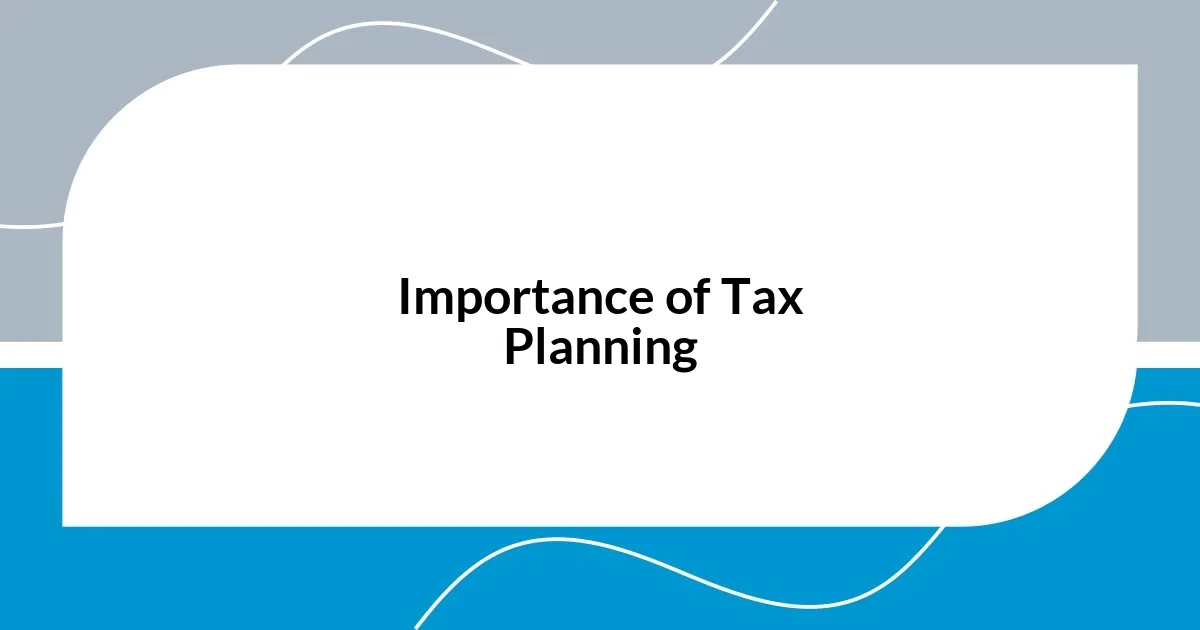
Importance of Tax Planning
Tax planning is an essential facet of achieving financial stability and success. From my perspective, effective tax planning can transform the way you perceive your finances. For instance, when I first started managing investments, I recognized that planning ahead for tax implications before selling an asset made a world of difference in my overall returns. It’s like having a roadmap: knowing the route ahead allows you to better navigate financial decisions and avoid unexpected pitfalls.
- Minimizes tax liabilities, helping you keep more of what you earn.
- Allows you to strategically time income and deductions, optimizing your tax situation.
- Facilitates informed decisions on investments and major purchases, preventing surprises at tax time.
- Promotes compliance with tax regulations, reducing the risk of audits and penalties.
- Empowers you to leverage available tax credits and deductions that can significantly reduce your taxable income.
While I was preparing for my first home purchase, I learned that understanding mortgage interest deductions could save me thousands of dollars. It was a lightbulb moment for me—I realized that knowledge truly is power in the realm of taxes. Embracing this proactive approach has not only eased my worries but fueled my confidence as I make strides toward financial goals.
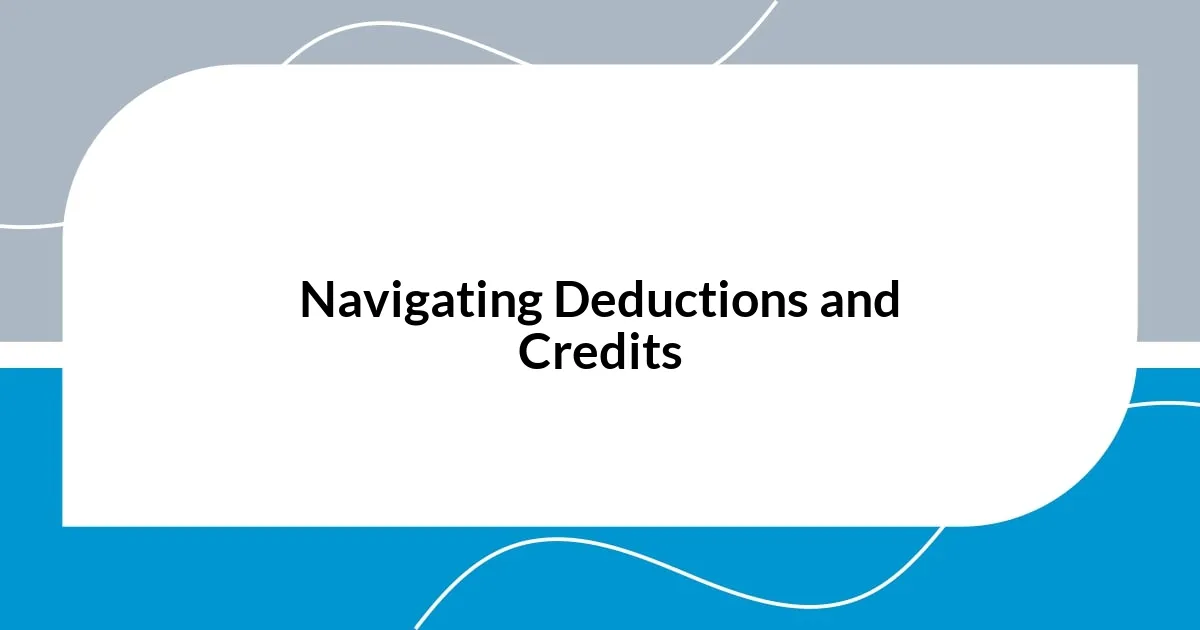
Navigating Deductions and Credits
Navigating deductions and credits can feel like walking through a maze, especially with all the intricacies involved. When I was preparing my first tax return, I discovered the importance of tax credits versus deductions. It was eye-opening—I realized that credits directly reduce my tax bill, while deductions just lower my taxable income. This distinction helped me focus on the credits I qualified for, which ultimately made a noticeable difference.
I remember feeling overwhelmed by the various tax forms and instructions. The moment I found out about the Earned Income Tax Credit (EITC), it was like a light bulb went off. This credit truly helped me see how my hard work could provide financial relief. Sometimes, I wonder how many people miss out on such credits simply because they aren’t aware of them. Have you ever checked if you qualify for a tax credit that could lighten your load? It’s definitely worth researching.
Experiencing the impact of deductions and credits firsthand has reshaped how I approach tax season. For instance, last year, I painstakingly tracked my education expenses, which included course fees and supplies. The educational tax credit I claimed not only saved me money, but also reaffirmed my belief in lifelong learning. Each year, I aim to optimize my deductions and credits—treating them as essential tools rather than merely paperwork. Embracing this strategy has transformed tax season from a source of stress into an opportunity for financial empowerment.
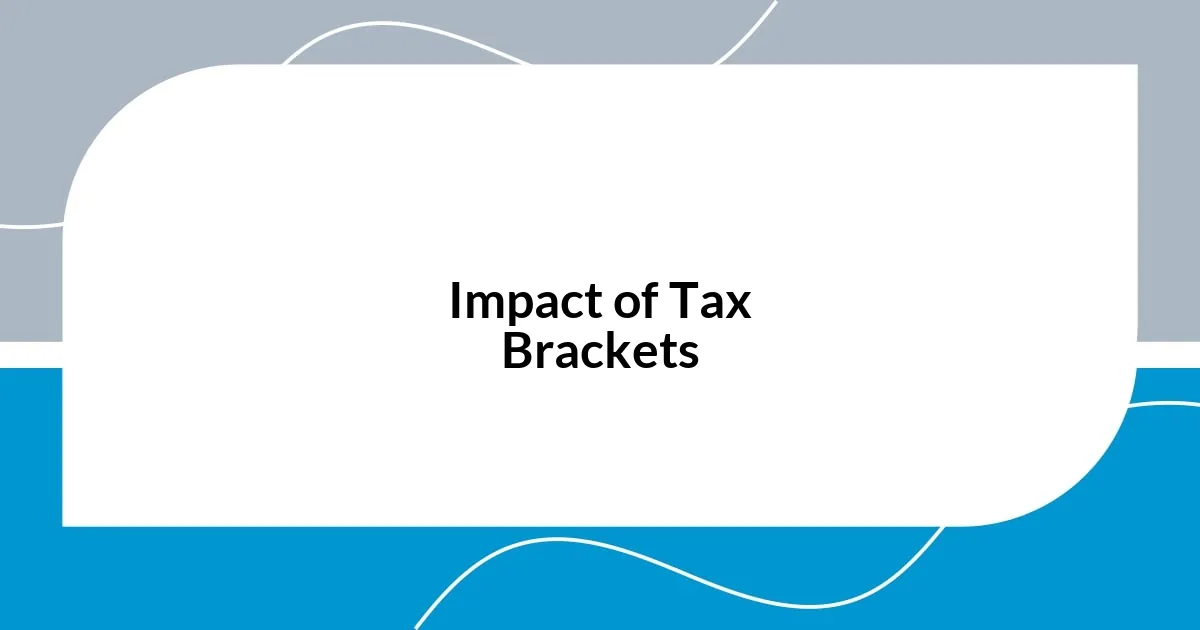
Impact of Tax Brackets
The impact of tax brackets on your financial situation can be quite pronounced. For instance, when I received a promotion and my income increased, I quickly realized that moving into a higher tax bracket meant I’d be paying a greater percentage of my income in taxes. At first, this felt discouraging, but then I reframed it as a sign of progress—a tangible reminder that I was moving forward in my career.
Navigating tax brackets can also lead to strategic decision-making. I once found myself at a crossroads, debating whether to take on extra freelance work during a high-earning year. The thought of potentially nudging into the next tax bracket initially worried me. But then I realized that the additional income could also support my long-term goals, like saving for retirement and investing in my skill set. Have you ever faced a similar dilemma? Sometimes, understanding how tax brackets operate allows for better alignment of your financial strategies rather than making hasty decisions based solely on fear of taxes.
Engaging with tax brackets can feel like a balancing act. While I aimed to maximize my income, I also learned to manage my deductions wisely. For example, when evaluating my investments, I would consider how capital gains tax would influence my decisions. This perspective shifted my thinking: rather than fearing tax implications, I started viewing them as a puzzle to solve. Each decision became part of a larger strategy, fostering a sense of control over my finances that I hadn’t experienced before.
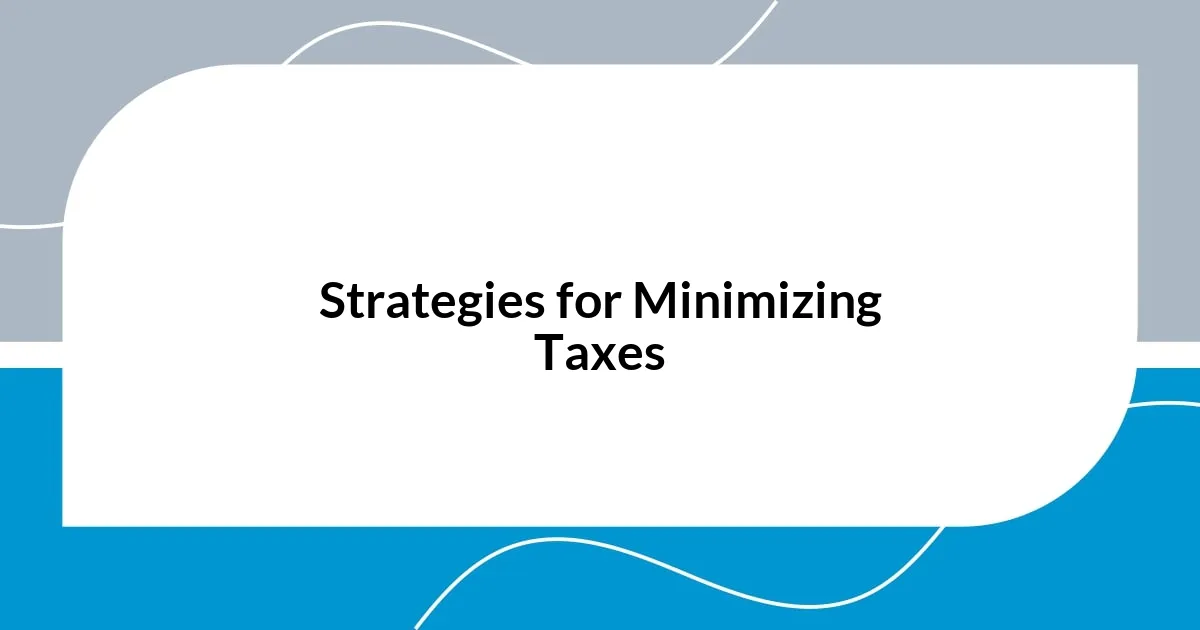
Strategies for Minimizing Taxes
One effective strategy I’ve embraced for minimizing taxes is maximizing contributions to tax-advantaged accounts. For example, I’ve consistently contributed to my Health Savings Account (HSA), which not only gives me a deduction on my taxable income but also allows my investments to grow tax-free. It feels empowering to know I’m saving for healthcare while simultaneously lowering my tax burden. Have you considered how contributing to an HSA or a 401(k) could significantly impact your tax situation?
Another key tactic I’ve found valuable is the timing of my income and expenses. I remember a particularly lucrative year when I had to decide whether to accelerate some expenses into the current tax year or defer income to the next. After weighing my options, I chose to prepay business expenses, which ultimately reduced my taxable income that year. By being strategic about timing, I could enjoy a considerable tax break—an approach I strongly recommend if you’re anticipating fluctuations in income.
Lastly, I can’t emphasize enough the importance of keeping detailed records throughout the year. When tax season rolls around, having documented expenses, receipts, and mileage logs makes identifying potential deductions a breeze. I often think back to the headaches I faced during my earlier tax filings, scrambling to find paperwork. Now, I view record-keeping as a proactive strategy, aligning my financial goals with tax efficiency. How do you manage your financial records? Being organized can really be a game-changer during tax time.
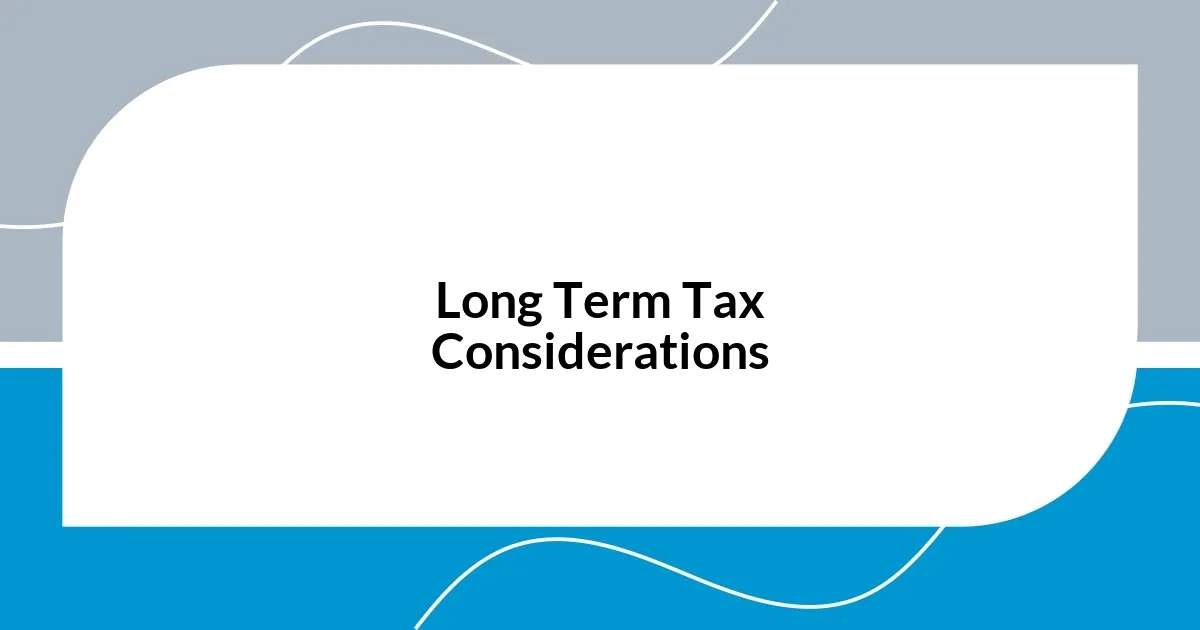
Long Term Tax Considerations
Long-term tax considerations loom large over our financial strategies. I remember a time when I evaluated my retirement portfolio and realized that the tax implications of my investments could have a lasting impact. Recognizing the differences between tax-deferred and tax-free accounts shifted my perspective entirely. Wouldn’t it be great if every financial decision felt that straightforward? Yet, the reality is often more complex—it’s essential to adopt a forward-thinking mindset.
In my experience, the compounding effect of taxes on investments cannot be understated. Watching my retirement savings grow has been exhilarating, but then I considered the potential tax burdens down the line. I recall a conversation with a tax advisor who emphasized the importance of understanding how future capital gains taxes could significantly alter my planned withdrawal strategy. Have you ever thought about how your current investment decisions will affect you years down the road? Personally, this has led me to invest more in vehicles that offer tax advantages, such as Roth IRAs, which I believe will pay off in the long run.
Moreover, the inflation of tax rates is another consideration that keeps me on my toes. I sometimes think back to my early career, when I felt complacent, assuming rates would remain stable. But as I’ve witnessed changes over the years, it became clear that remaining informed is paramount. A well-researched, proactive approach allows me to navigate these uncertainties. Wouldn’t it be wise to actively plan for possible changes in tax legislation? This is where a long-term tax strategy makes all the difference, helping to mitigate the impact of such fluctuations on my overall financial health.